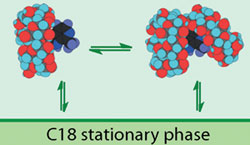Spanish scientists have devised a greener form of liquid chromatography by using cyclodextrins as additives in the mobile phase. This results in more water being used in the chromatographic process.
Cyclodextrins are a natural, renewable compound made from starch and are totally biodegradable. They can be modified and tailor made, and as a result are used in a variety of fields including the pharmaceutical, food and cosmetic industries.
High performance liquid chromatography (HPLC) is a commonly used analytical technique that allows fast separation and quantification of compounds in complex mixtures. Owing to its high resolution and sensitivity, it is widely employed in academic and industrial settings.

Using cyclodextrins in chromatography could increase the amount of water being used
|
Antonia Martin and colleagues from the Complutense University of Madrid investigated ways of reducing the amount of acetonitrile and developing chromatographic methods that use an increasing amount of water and renewable solvents like ethanol. 'Due to the toxicity of acetonitrile, these mobile phases have to be treated as chemical waste, so we were interested in using non-toxic solvents, especially alcohols, as an alternative,' says Martin.
Being greener is only a benefit if the performance of the new system is comparable to current methods. To check this, Martin and her team tested for beta-carbolines, a naturally occurring alkaloid linked to neurological diseases, in human blood serum. The results were as good as non-cyclodextrin modified HPLC in terms of accuracy - in fact the cyclodextrins increased the detection sensitivity.
Peter Dunn, a leader in green chemistry at Pfizer, Sandwich, UK, found it interesting that Martin's team had used cyclodextrin-based mobile phases to replace the acetonitrile. 'There was a rapid increase in the price of acetonitrile during 2008 so these substitutions will lead to significant cost benefits as well as green chemistry benefits,' he adds.
Rebecca Brodie
Interesting? Spread the word using the 'tools' menu on the left.




